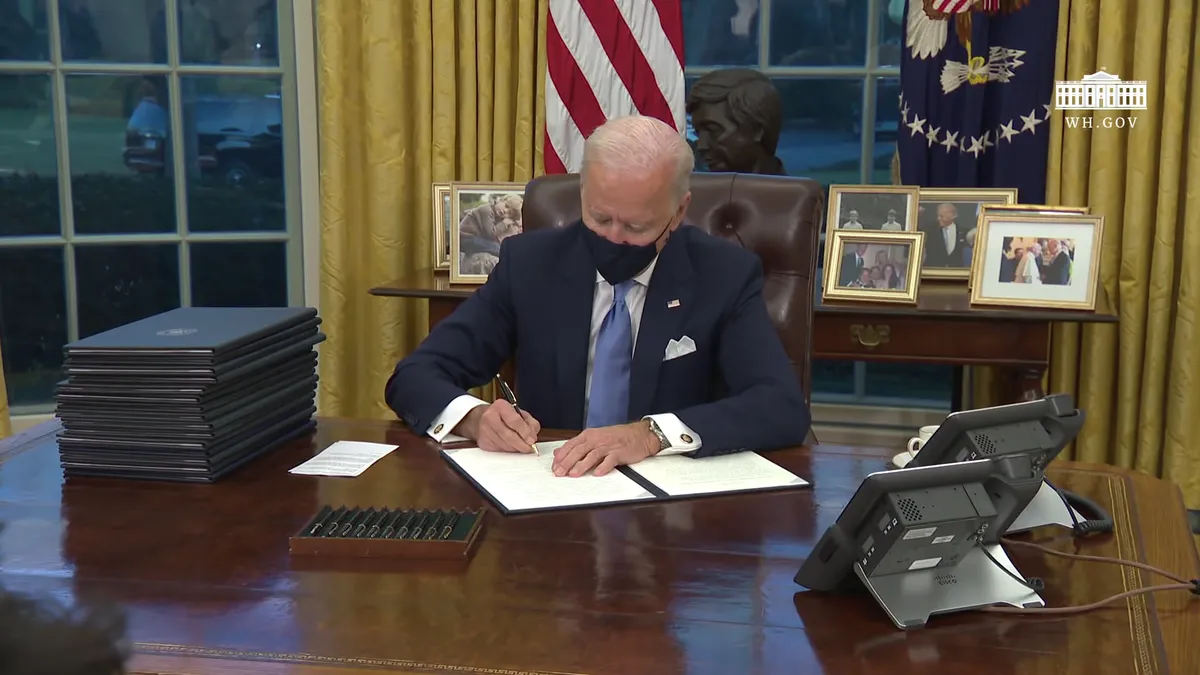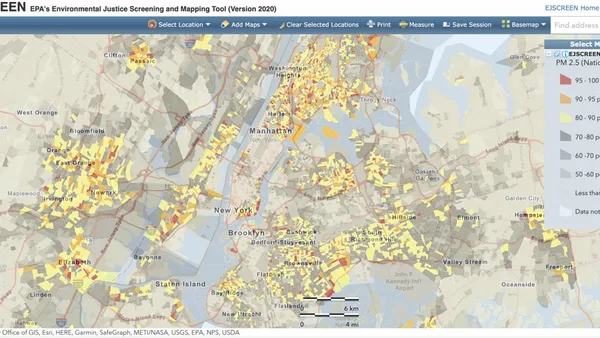Dive Brief:
- President Joe Biden on Wednesday marked his first day in office by taking steps to rejoin the Paris climate accord, along with signing a flurry of executive orders.
- One executive order Biden signed is intended to "restor[e] science" and tackle the climate crisis by reviewing several agency actions taken under former President Donald Trump, including on energy efficiency, coal ash, the National Environmental Policy Act (NEPA), fuel efficiency standards, and more. He also signed an order intended to review industry influence on the regulatory process.
- Biden has long pledged to make climate and clean energy a priority under his administration, and stakeholders say these day one actions signify that will be the case.
Dive Insight:
Biden ran his campaign in part on bringing the U.S. electric grid to 100% carbon-free electricity by 2035, and decarbonizing the entire economy by mid-century. Though policy observers say that goal may be difficult to mandate, even with a majority Democratic Senate and House, Biden's first day in office was marked by immediate action on climate and clean energy that will likely mark a very different executive branch than that of his predecessor.
"I think the signal he is trying to send is to say America is back in the game," said Leah Rubin Shen, a director at Advanced Energy Economy, which advocates for clean energy business interests. "One of the things that [Biden's] been saying all along ... is the extent to which advanced energy is a huge job creator, and that investments in these programs ... really is going to help us with economic recovery."
Trump said the U.S. would pull out of the Paris accord early in his tenure, and the U.S. officially pulled out of the agreement just days before the results of the 2020 presidential election was announced.
Rejoining the Paris accord will mean the U.S. re-commits to reduce economy-wide emissions 26-28% below 2005 levels by 2025, including through power sector emissions reductions and tightened fuel economy standards.
How the U.S. will approach power sector emissions reductions under the international agreement remains unknown. On Tuesday, the U.S. Court of Appeals for the D.C. Circuit vacated the Trump Environmental Protection Agency's Affordable Clean Energy (ACE) rule that replaced the Obama-era Clean Power Plan. Legal experts noted that the U.S. Supreme Court would likely not allow a rule identical to the Clean Power Plan to stand, however, as the court prevented that rule from going into place in 2016, following protests by coal companies. Biden's plans to rejoin the agreement drew support from a wide array of groups including the American Petroleum Institute, American Gas Association, Solar Energy Industries Association, American Council on Renewable Energy and others.
The Biden administration does have a clearer path forward on vehicle emissions: It plans to develop new fuel economy standards ensuring 100% of new sales for light- and medium-duty vehicles will be zero emissions.
Under Trump, the EPA and National Highway Traffic Safety Administration (NHTSA) weakened national fuel efficiency guidelines requiring efficiency and emissions standards to increase 1.5% annually, versus the previous 5% standard. The administration also banned states from issuing their own fuel standards. Both changes were seen as critical hits to the electric vehicle industry, as well as states' own carbon reduction goals, and advocates say the new standards will boost that market for EVs.
Biden's agencies will also review several other Trump-era regulations under the president's "Protecting Public Health and the Environment and Restoring Science to Tackle the Climate Crisis" executive order. Key reviews include NEPA, appliance energy efficiency standards, air quality standards, coal ash regulations and more.
NEPA changes, finalized in July, were intended to "slash" environmental permitting reviews for energy and infrastructure projects that require federal review. The Trump administration also failed to update 25 appliance standards, which environmental and efficiency advocates say cost consumers billions while increasing pollution.
EPA under Trump issued several rules on utility coal ash management that extended compliance deadlines, allowing states to operate their own permitting programs, and altering technology and storage requirements for the waste. The Biden administration under Wednesday's executive order will review those regulations, as well as a recent EPA rule that narrows the studies it will consider in future rulemakings, and the agency's decision to keep particulate air matter standards the same.















